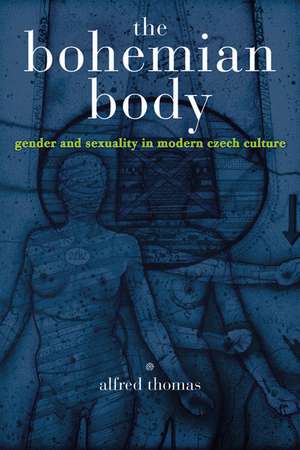The Bohemian Body: Gender and Sexuality in Modern Czech Culture
Autor Alfred Thomasen Limba Engleză Hardback – 10 apr 2007
The Bohemian Body examines the modernist forces within nineteenth- and twentieth-century Europe that helped shape both Czech nationalism and artistic interaction among ethnic and social groups—Czechs and Germans, men and women, gays and straights.
By re-examining the work of key Czech male and female writers and poets from the National Revival to the Velvet Revolution, Alfred Thomas exposes the tendency of Czech literary criticism to separate the political and the personal in modern Czech culture. He points instead to the complex interplay of the political and the personal across ethnic, cultural, and intellectual lines and within the works of such individual writers as Karel Hynek Mácha, Bozena Nemcová, and Rainer Maria Rilke, resulting in the emergence and evolution of a protean modern identity. The product is a seemingly paradoxical yet nuanced understanding of Czech culture (including literature, opera, and film), long overlooked or misunderstood by Western scholars.
By re-examining the work of key Czech male and female writers and poets from the National Revival to the Velvet Revolution, Alfred Thomas exposes the tendency of Czech literary criticism to separate the political and the personal in modern Czech culture. He points instead to the complex interplay of the political and the personal across ethnic, cultural, and intellectual lines and within the works of such individual writers as Karel Hynek Mácha, Bozena Nemcová, and Rainer Maria Rilke, resulting in the emergence and evolution of a protean modern identity. The product is a seemingly paradoxical yet nuanced understanding of Czech culture (including literature, opera, and film), long overlooked or misunderstood by Western scholars.
Preț: 493.54 lei
Preț vechi: 646.63 lei
-24% Nou
Puncte Express: 740
Preț estimativ în valută:
94.45€ • 102.56$ • 79.34£
94.45€ • 102.56$ • 79.34£
Carte indisponibilă temporar
Doresc să fiu notificat când acest titlu va fi disponibil:
Se trimite...
Preluare comenzi: 021 569.72.76
Specificații
ISBN-13: 9780299222802
ISBN-10: 0299222802
Pagini: 284
Dimensiuni: 152 x 229 x 23 mm
Greutate: 0.52 kg
Ediția:1
Editura: University of Wisconsin Press
Colecția University of Wisconsin Press
ISBN-10: 0299222802
Pagini: 284
Dimensiuni: 152 x 229 x 23 mm
Greutate: 0.52 kg
Ediția:1
Editura: University of Wisconsin Press
Colecția University of Wisconsin Press
Recenzii
“Thomas’s book is remarkable for its scope and intellectual coherence. He notes that the oscillation between the parochial concerns of a small nation under threat of cultural extinction and a cosmopolitan impulse, that is no less powerful, is evident in Czech literary scholarship. The Bohemian Body’s novel point of view is bound to stimulate discussion across the field of Czech literary criticism.”—Maria Nemcová Banerjee, Smith College, author of Terminal Paradox: The Novels of Milan Kundera
“Through a series of careful readings of modern Czech-language literature and film, Thomas deploys gender analysis to reveal a consistent interplay within the texts between the personal and the political, as well as between local and European identities. Wary of strict categorizations, he celebrates complexity and plurality. Engagingly written and well-argued, The Bohemian Body will challenge historians and literary critics alike to rethink how we interpret Czech works of art.”—Chad Bryant, University of North Carolina at Chapel Hill
Notă biografică
Alfred Thomas is professor and head of Slavic and Baltic Languages and Literatures at the University of Illinois at Chicago. He is author of several books, including Anne's Bohemia: Czech Literature and Society, 1310–1420. He is also the coeditor of Cultures of Forgery: Making Nations, Making Selves.
Extras
“At the heart of the tension between individualism and collectivism is the paradox of modernity itself. The rise of nationalism at the end of the eighteenth century witnessed the concomitant emergence of a discourse of human rights and a new emphasis on the dignity of man as an individual. Thus, at the precise moment when the earliest writers of the National Revival began to forge a political sense of their collective identity as Czechs, they were also confronting other constructions of identity such as socialism, feminism and, somewhat later, a proto-gay rights movement.”
Descriere
The Bohemian Body examines the modernist forces within nineteenth- and twentieth-century Europe that helped shape both Czech nationalism and artistic interaction among ethnic and social groups—Czechs and Germans, men and women, gays and straights.
By re-examining the work of key Czech male and female writers and poets from the National Revival to the Velvet Revolution, Alfred Thomas exposes the tendency of Czech literary criticism to separate the political and the personal in modern Czech culture. He points instead to the complex interplay of the political and the personal across ethnic, cultural, and intellectual lines and within the works of such individual writers as Karel Hynek Mácha, Bozena Nemcová, and Rainer Maria Rilke, resulting in the emergence and evolution of a protean modern identity. The product is a seemingly paradoxical yet nuanced understanding of Czech culture (including literature, opera, and film), long overlooked or misunderstood by Western scholars.
By re-examining the work of key Czech male and female writers and poets from the National Revival to the Velvet Revolution, Alfred Thomas exposes the tendency of Czech literary criticism to separate the political and the personal in modern Czech culture. He points instead to the complex interplay of the political and the personal across ethnic, cultural, and intellectual lines and within the works of such individual writers as Karel Hynek Mácha, Bozena Nemcová, and Rainer Maria Rilke, resulting in the emergence and evolution of a protean modern identity. The product is a seemingly paradoxical yet nuanced understanding of Czech culture (including literature, opera, and film), long overlooked or misunderstood by Western scholars.
